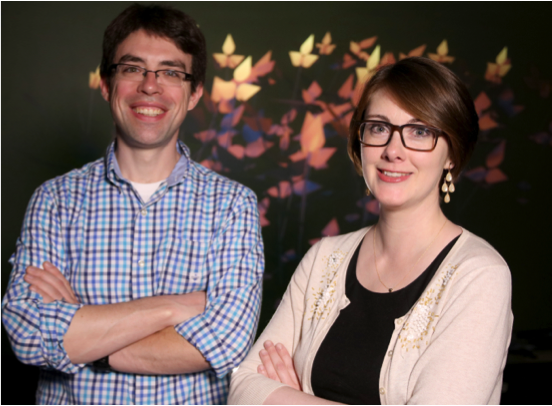Posted: June 1, 2017
Collaborator Amy Marshall-Colón, Assistant Professor of Plant Biology at the University of Illinois at Urbana-Champaign, has been awarded $274,000 from The Foundation for Food and Agriculture Research (FFAR) to support her project, Crops in silico (Cis).
From University of Illinois at Urbana-Champaign:
The Foundation for Food and Agriculture Research (FFAR) has awarded Principal Investigator Amy Marshall-Colón, Assistant Professor of Plant Biology at the University of Illinois at Urbana-Champaign, $274,000 to continue her research in support of Crops in silico (Cis), a project to develop a suite of virtual plant models that may help resolve a growing gap between food supply and demand in the face of global climate change.
As the planet warms, growing environments around the world are changing faster than traditional crop breeding programs can create new well-adapted varieties. Fully realized, Cis will give crop researchers a tool to examine the effects of environmental challenges on a molecular, cellular, and organ level within a plant to determine the best targets for genetic engineering.
"Science is accelerating faster than ever before, and the Foundation for Food and Agriculture Research is committed to harnessing cutting-edge science for the benefit of the agricultural system," FFAR Executive Director Sally Rockey said. "Crops in silico will integrate some of today's most advanced plant models, providing new and exciting insights into how a plant functions that will undoubtedly accelerate our ability to improve plants. I look forward to the results of this exciting project."
The ability to computationally mimic the growth, development, and response of crops to the environment will allow researchers to conduct many more experiments than can realistically be achieved in the field.
Marshall-Colón will collaborate with Stephen P. Long, the Gutgsell Endowed Professor of Crop Sciences and Plant Biology, Matthew Turk, Assistant Professor of Information Sciences, Assistant Research Professor of Astronomy and National Center for Supercomputing Applications (NCSA) Research Scientist, Christine Kirkpatrick, Executive Director of the National Data Service, and Jonathan Lynch, University Distinguished Professor of Plant Science at Penn State University. The team will work to integrate above- and below-ground models of plants to create never-before-seen "whole views" of them. Then, they will subject these newly built virtual plants to computer-simulated extreme growing conditions -- from flood to severe drought to increased ambient carbon dioxide -- and compare the model's predicted plant reaction to observed responses from field studies. This will help "dial in" the model's accuracy.
Beyond a technological breakthrough, the Cis team also aims to achieve a research community shift.
"We believe Crops in silico will unite largely isolated efforts into a connected and collaborative community that can take full advantage of advances in computation science and mechanistic understanding of plant processes and their responses to the environment," Marshall-Colón said.
The Crops in silico project was seed-funded in 2015 by a $350,000 grant from the Institute for Sustainability, Energy, and Environment (iSEE) at the University of Illinois at Urbana-Champaign awarded to Long. NCSA recently awarded additional seed funding for Cis to Turk. The awards from iSEE and NCSA will provide matching funds to support the Cis team and its work under the FFAR grant, the first given to a University of Illinois researcher.
Marshall-Colón and Long are iSEE Faculty Affiliates and an NCSA Faculty Fellows.
Read more on the project page on iSEE's website, or visit the Cis homepage at cropsinsilico.org.
The Foundation for Food and Agriculture Research, a 501(c)(3) nonprofit organization established by bipartisan congressional support in the 2014 Farm Bill, builds unique partnerships to support innovative and actionable science addressing today's food and agriculture challenges. FFAR leverages public and private resources to increase the scientific and technological research, innovation, and partnerships critical to enhancing sustainable production of nutritious food for a growing global population. The FFAR Board of Directors is chaired by Mississippi State University President Mark Keenum and includes ex officio representation from the U.S. Department of Agriculture and the National Science Foundation. Learn more at www.foundationfar.org.



